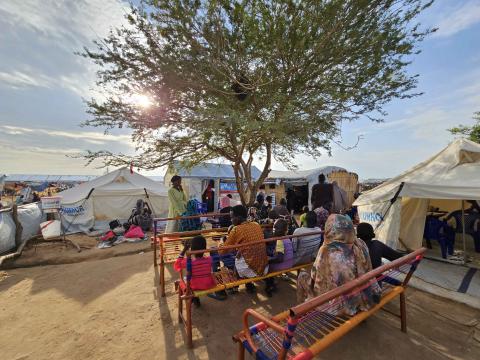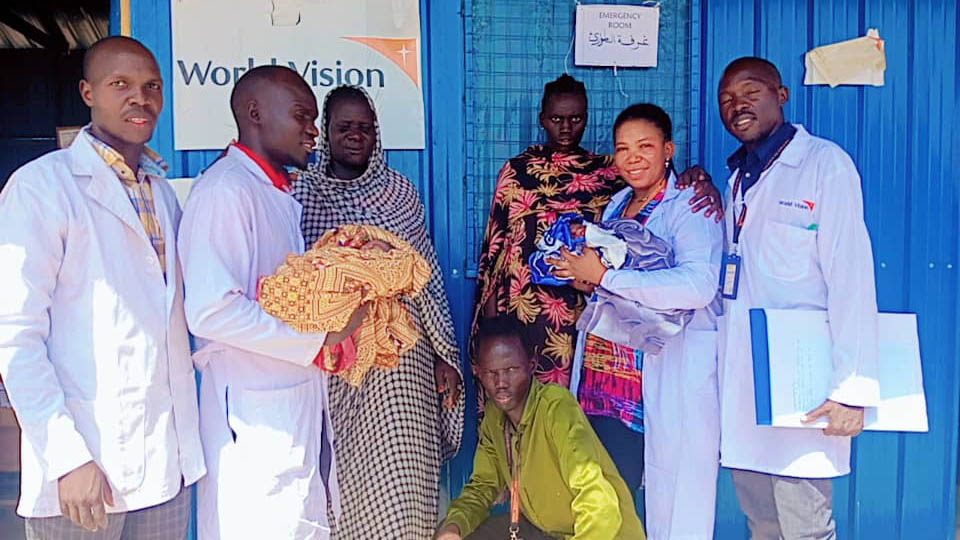How can we do ENOUGH: Displaced people from Sudan speak about their needs

Stephen Leonard Epiu, technical lead for World Vision in South Sudan’s health, nutrition, water, sanitation, and hygiene interventions, recently visited the temporary settlements for the refugees and South Sudanese returnees from Sudan. In this short reflection piece, Stephen shares how women and children are disproportionately affected by humanitarian crises and why their needs need to be prioritised.
Juba, South Sudan -- I recently visited World Vision South Sudan’s emergency response operations in Renk County, Upper Nile State. Alongside another WV staff member, I conducted a focus group discussion (FGD) with the 'new arrivals' at the center. The term 'new arrivals' refers to people from Sudan, including refugees and South Sudanese returnees, who have fled their homes and recently crossed into South Sudan. Most refugees and returnees enter South Sudan through the Joda crossing point in Renk.
Ten new arrivals participated in the FGD, comprising eight women and two men. The FGD provided valuable insights into the experiences of people fleeing the conflict in Sudan. These insights are crucial for World Vision and other humanitarian partners as these can significantly impact the improvement of existing interventions and the development of new strategies to address the needs of refugees and returnees. Allow me to share the highlights of the FGD:
- Women had to walk for at least 10 days before they could get a transportation that will bring them to South Sudan.
- Women had to travel with their children without their husband because “our husbands were not allowed to come with us.”
- Women have an average of 2-3 children.
- All participants indicated that they were able to bring nothing with them, except for few clothes.
- All participants claimed experiencing starvation as they spent days with limited food during their journey to South Sudan. They also arrived at Joda crossing point late – 5pm – and the humanitarian team responsible for registration had already left. They were not able to receive high energy biscuits that night and they ate nothing. “Our children are so hungry and we have nothing to give them.”
- One of the participants used to be a university lecturer and expressed interest for any opportunities to teach and relocate to another country with her children.
- Women participants express concern that they do not have menstrual hygiene kits. They need those urgently.
- Among the priority needs the participants expressed include (listed based on priority):
- a safe place to stay free from insecurity
- food and cooking utensils
- hygiene kits
- containers for fetching water and for storage
- soap
- For the two men who participated, they said they were only able managed to escape “because we are sick, and the doctor gave us referral letter for medical treatment.”
At the Renk Transit Center, I also met two mothers who had just given birth in the WV-supported health clinic at the transit camp. One of the mothers, 18-year-old Toma, had just given birth to her second baby, and she claimed it was a miracle to be able to do so.
"I thought I would not make it," she said. "Being pregnant, I had no idea what would become of me and my unborn baby. Thank God my husband and I escaped the conflict, but it took several weeks to reach Renk. I am glad to be in Renk because it is safe. I no longer hear the sound of gunshots. More importantly, I am glad I have safely given birth to this baby. It is like a miracle."

Toma said that throughout their journey to Renk, she almost gave up. But she's glad that she held on and was able to meet our emergency health team. "The World Vision's workers were so kind. They took good care of me throughout my pregnancy. They always checked my baby and kept reassuring me that all was well," she said. World Vision staff member Rose, who is a midwife, was able to help Toma deliver her baby safely.
As always, women and children bear the most consequences of conflict. These mothers hardly had anything, yet they had to take care of themselves and their children. It is important to note that hygiene requirements for women and girls continue amidst conflict. There is a need to increase access to resources for all women and girls fleeing the war.
**
World Vision continues to prioritise the needs of women and children. It is our goal that every child is well-nourished with nutrient-rich food, has access to quality health care, and is vaccinated for all vaccine-preventable illnesses. This means health nutrition services, primarily on maternal and child health, are prioritised in funding allocations, longer term investments, and emergency interventions.
Story by Stephen Leonard Epiu, Health, Nutrition, and WASH Technical Manager, World Vision South Sudan